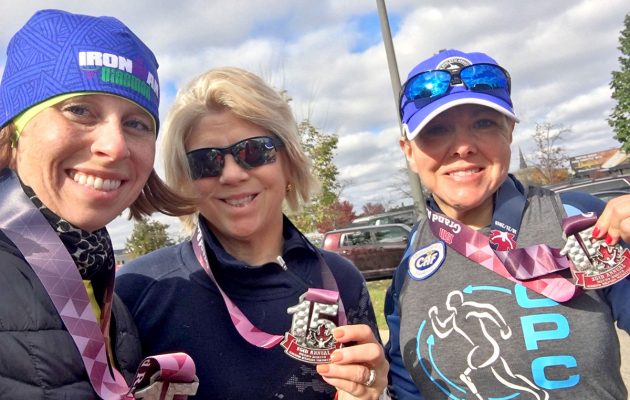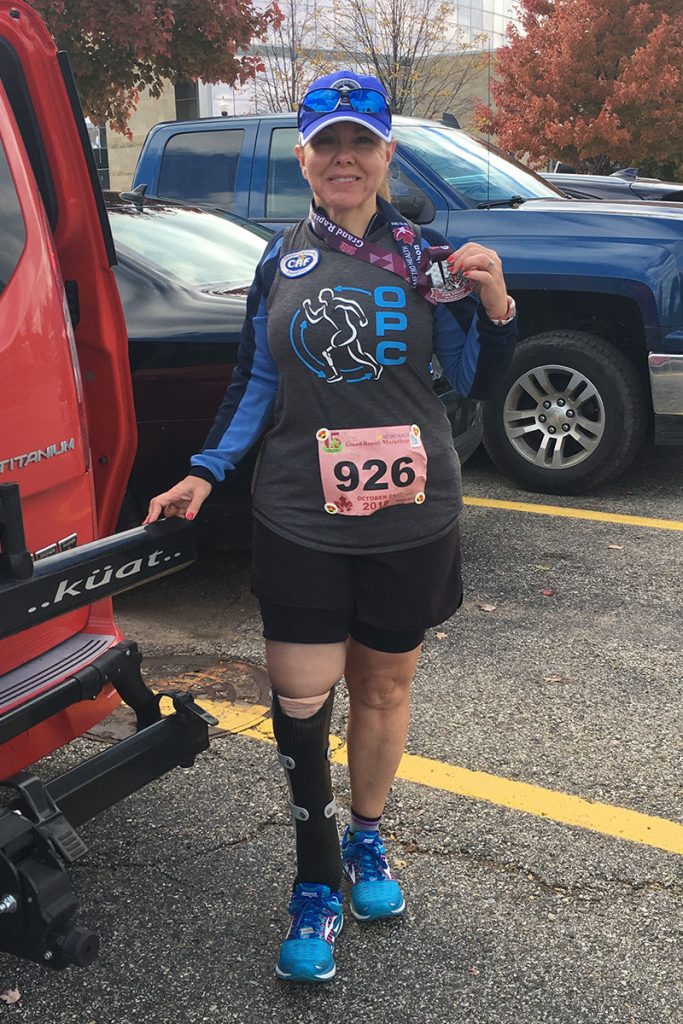Prosthetic leg doesn’t deter marathon runner

Kelly Luckett doesn’t believe in letting an impairment keep her sidelined. Despite having lost her right leg in an accident with a lawnmower when she was two years old, Luckett has run 35 marathons, including 13 consecutive Boston Marathons, as well as 10 ultramarathons (distances from 50K to 100K), and also 95 races of distances from 5K to half-marathon.
Now 51, Luckett doesn’t remember ever having both feet. She grew up in Louisville, Kentucky, with two brothers and two sisters. “I was the youngest, but I don’t think they treated me any differently than if I hadn’t had a prosthetic leg.”
However, Luckett remembers she was always the last one picked for teams at recess. “Several kids in the private grade school I attended from Grades 3-8 bullied me relentlessly for all five years,” she said.
Luckett was fitted for her first prosthetic soon after the accident. “I don’t have any memory of learning to use it, but I do remember having to be fitted often for a new leg, since I kept outgrowing them, just as kids outgrow their shoes and clothes when they are young.”

It wasn’t until she was 30 and cheering on her husband, Brian, as he ran in Atlanta’s Peachtree Road Race 10K, that she decided to try running. “I’d always wanted to be a runner, but it was difficult with a clunky prosthetic foot made for only walking,” Luckett said.
“I was tired of being just a spectator,” she said. “I realized there were runners who were all sorts of shapes, sizes, and speed and thought, ‘Who cares if my running gait is clunky and slow?’” She ran her first race at the Peachtree Road Race 10K.
Running marathons has increased her self-confidence. “Everyone has challenges in some way,” Luckett said. “Striving to overcome those challenge is the way to live your best life.”
Luckett’s challenges are mostly the same as for other marathon runners, but with a prosthetic leg she has to make sure she has the right fit to avoid having her residual limb move around in the prosthetic socket which causes pain and bruising or skin abrasions. “Also, it takes more energy for a runner with a prosthetic leg to cover the same distance at the same speed as a non-amputee runner,” she said.
A prosthetic running leg (carbon fiber blade and socket) costs $15,000 or more and isn’t covered by medical insurance. “I’ve been fortunate to have sponsorships from prosthetic companies such as Orthotic & Prosthetic Centers, here in Jacksonville, to provide my running leg and grants from Challenged Athletes Foundation to help cover my expenses to the Boston Marathon,” she said.
“My prosthetist, Stephanie Walker, with Orthotic & Prosthetic Centers, really listens,” Luckett said. “She’s enthusiastic about my running, and she works magic to get my leg to fit properly and resolve any issues that come up.”
Walker has helped Luckett try the “socket-less socket” by Martin Bionics. It’s a newer type of prosthetic socket that is adjustable and flexible for the user, unlike a traditional socket that is hard and fully enclosed. Luckett trained and completed the Grand Rapids Marathon in October with the Martin Bionics walking leg. Her finish at the Grand Rapids Marathon qualified her for Boston Marathon’s mobility-impaired division in 2019.
Luckett and her friend, BethAnn Perkins, have run the Boston Marathon at least six times, including the 2013 Boston Marathon. They were about three-quarters of a mile away from the finish line when the bombs went off.
“I will never be able to mentally or emotionally process the fact that I qualified for the Boston Marathon only because I was an amputee, yet over a dozen people who were near the finish line that day to cheer for the runners became amputees,” she said.
Luckett and her husband moved to Jacksonville because they wanted more opportunities for employment as well as better access to healthcare, recreation and the arts. Brian is a classical guitarist and adjunct professor of classical and flamenco guitar in Jacksonville University’s Music Department. Kelly is a marketing analyst for Healogics, an advanced wound care provider.
The couple loves historic homes and historic preservation. They owned a 1928 Craftsman bungalow in Atlanta and then an 1892 Victorian home in Savannah, Georgia, prior to moving to Jacksonville.
“We knew we wanted to live in one of Jacksonville’s historic neighborhoods,” Luckett said. They found a 1928 brick bungalow in the St. Johns Park neighborhood. “It has the original historic details we were looking for, such as plaster walls and original windows, trim and floors, and it’s a nice, quiet neighborhood tucked between Avondale and Ortega.”






